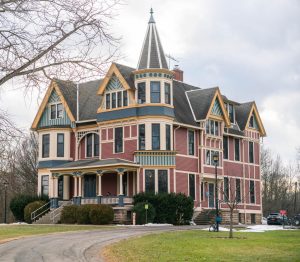College Makes First Layoffs in More than 10 Years
October 31, 2014
The College is laying off three employees due to the recent switch from coal to natural gas in the College’s heating plant. The three heating plant engineers in question must decide by Nov. 5 either to leave the College entirely or to accept a custodian position with a 35 percent cut to their current pay.
“I’ve been here for 33 years. This is the first time that I’ve ever known that the College has [permanently] laid off service workers,” said Milton Wyman, a member of the Oberlin College Facilities department and chairman of the local United Auto Workers, one of the four unions on campus.
According to one of the engineers, the layoffs were a result of the fact that the new natural gas heating plant is less labor-intensive.
The three workers being laid off are members of the UAW. The three engineers received the letter from Human Resources informing them of being laid off the day after a new UAW contract — which did not include a clause about the heating plant engineers — was signed and approved by all the workers.
“It was really orchestrated so well; it was like a punch in the mouth,” said Paul Safer, one of the engineers being laid off. “This is our careers being put into the sewer. It could have been done more humanely. ”
According to Director of Media Relations Scott Wargo, the layoffs are being executed in accordance to College policy.
“The transition of [heating plant] engineers into other positions is being handled in accordance with the provisions set forth in the collective bargaining agreement,” Wargo said in an email to the Review. “Oberlin does not currently have open positions available in pay classifications similar to their current classifications.”
Wyman, however, said that he believes the College was misrepresenting the situation and that the administration indirectly denied them the other higher pay-grade vacancies that were available at the time of their layoffs.
“They left custodian vacancies open,
some of them since February,” Wyman said. “We think that was done intentionally to try to discourage these guys from even staying here,” said Wyman.
Wyman emphasized that retraining the workers for other similarly paid positions would have been “very easy,” especially if the laid-off workers had been retrained to work on air conditioning. Heating and air conditioning are “sister trades,” said Wyman.
Both Wyman and Safer also said they believe that the layoffs are unnecessary and will prove costly for the College.
“There’s a lot of work to do on the side. We have nine miles of steam lines in Oberlin, and there’s a lot to be repaired on these. We could do the maintenance,” said Safer.
Wyman also noted that three of the engineers retained by the College are over 60 years old and are close to retirement, so the College will have to hire new engineers soon anyway.
“If you keep these people on hand, they already have knowledge of everything. A lot of times they bring in outside people, and a lot of times it costs double or triple,”
said Wyman. In both the new and old versions of the
UAW contract, the contract states, “When an employee is involuntarily demoted to a class in a lower pay grade, he or she shall not suffer a loss in his or her pay.”
According to Wyman, the College and the UAW are still trying to work out an agreement. But if no compromise can be found, the UAW may file an official complaint — an action that would trigger a long and costly arbitration process.
To Safer, the process of being laid off has become all too familiar. In 2002, the American Crayon company of Sandusky, Ohio that Safer worked in closed down and moved to Mexico. Safer then worked in a steel factory until being laid off from there as well. “Now I’m on my third round,” Safer said.
“Oberlin College, if something like this came up in the past, usually had a heart for people. They give us a response that the ‘world is changing, times are changing.’ … I guess when they give me those statements, it sounds like they don’t care about people anymore, just rankings,” said Wyman.
























